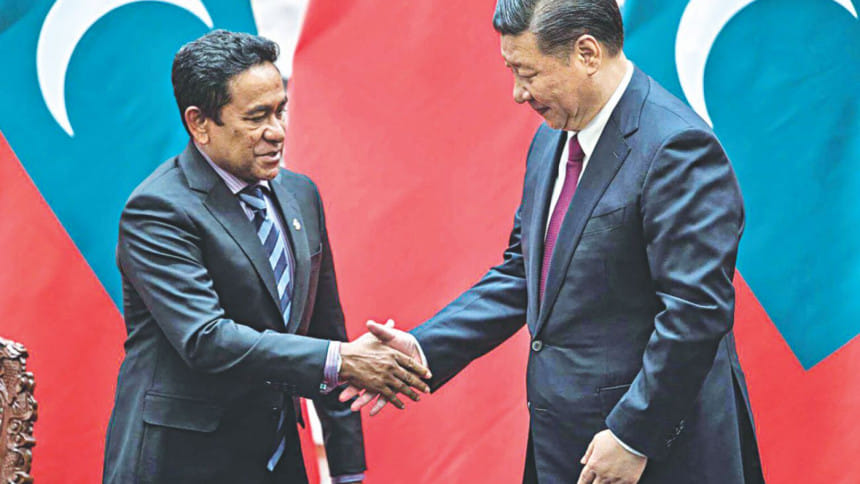Maldives political crisis and a geopolitical tussle

Political unrest in neighbouring Maldives is bad news for Delhi. What is happening in the Maldivian archipelago cannot be seen devoid of geopolitics, particularly between China on the one hand and India and the US on the other. India is particularly worried that China has made significant inroads into Maldives—so close to its coastline. This geopolitical tussle has come to the fore after a political confrontation between President Abdulla Yameen and the judiciary.
The current crisis started when on February 2, 2018, the Supreme Court in a unanimous judgement ordered the government to release the 12 jailed members of Majlis (parliament) and asked for a retrial of their cases. The court also rejected the terrorism case against former President Mohamed Nasheed. In July 2017, these members of the ruling Progressive Party of Maldives (PPM) in the Majlis, who went against the president, were jailed on charges of corruption. An adamant Yameen refused to comply with the court order and instead declared a 15-day State of Emergency on February 5. The following day, Maldives Defence Force arrested the Chief Justice Abdulla Saeed along with Judge Ali Hameed and opposition leader Maumoon Abdul Gayoom (80), former president (1978-2008). Gayoom, Yameen's half-brother, has been charged for bribery and attempting to overthrow the government.
The declaration of emergency impelled former President Mohamed Nasheed, exiled in London, to urge neighbouring India to send "an envoy, backed by its military" to free the two judges and Gayoom, and restore democracy in the island country.
These drastic steps came as President Yameen wanted to quash a no-confidence motion threatened by the Maldives United Opposition. Yameen, who leads the Progressive Party of Maldives, also changed the rules of procedure of the Majlis that inhibited the impeachment bill.
Politics in Maldives became complicated since Yameen took over as president in 2013. Over the past years, he has grown intolerant and authoritarian. His government has jailed former president Nasheed, suppressed peaceful protests, media outlets were shut down, and political opponents were sent to jail—while the opposition leaders accused Yameen of widespread corruption. Currently, Yameen's PPM is badly split and his coalition has fallen apart. Yet Yameen seems determined to hang on to power and be elected for another term.
Delhi is in dilemma over Maldives. Can Delhi respond to Nasheed's appeal and unilaterally intervene to save "democracy" in Maldives? Can India oust the "legal" government of Yameen? Does the Action Plan for Defence Cooperation (signed in April 2016) between the two countries allow India to intercede on behalf of one group or another in Maldives? This archipelago of 1200 islands so close to the Indian coastline, with a population of about 400,000 Sunni Muslims, was traditionally under India's sphere of influence. India in 1988 intervened militarily when a group of mercenaries tried to overthrow President Gayoom. At that time, Delhi came forward to save the "legally constituted" government of Gayoom. But what now?
Delhi's predicament has been raised higher because of the likelihood of China establishing a naval base in Maldives. Yameen, since coming to power, has slowly and determinedly moved towards Beijing. For India's External Affairs Ministry doing nothing is not an option, but what are the alternatives that will not put Delhi into an aggressor's role? If an unstable Maldives pose a security threat to India, Delhi could intervene militarily. But there is no such excuse. The other possibility could have been a UN Security Council resolution to intervene, which could cover up Delhi's probable intervention. On February 8, the UNSC did meet in a closed-door session to get an update on the political situation in Maldives. Secretary General António Guterres has called upon President Yameen to lift the emergency and restore citizens' rights. Adopting a resolution was a far cry given China's position on Maldives.
China, which did not have an embassy in Male until 2011, has now growing economic and trade relations with Male. President Yameen signed a Free Trade Agreement and an MOU on Maritime Trade Plan with Beijing in December 2017, which allows Maldives tax-free entry of all its exportable goods into China. Besides, Maldives has agreed to China's maritime Silk Road—much to Delhi's consternation. Beijing has invested hundreds of millions of dollars in Maldives' airport expansion projects apart from housing and other projects.
To protect its interests, China has warned India, Saudi Arabia, the US and others not to "complicate the situation" by interfering in the unfolding crisis. It called on all to respect Maldives' sovereignty.
Narendra Modi has already spoken to Donald Trump about the Maldives situation. The Indo-US strategy is to regulate the sea lanes stretching from the Maldives archipelago to Seychelles onto Diego Garcia, thereby controlling Chinese trade volume and Chinese warships through these shipping lanes in case of a confrontation with China.
With massive Chinese investments in Sri Lanka and Pakistan, India is feeling encircled by China, a big player in the Indian Ocean now. Which government will control Maldives has become the centre of geopolitical rivalry, given the strategic calculations of both India and China. In hindsight, Delhi should have invested more in Maldives and not allowed it to drift to Beijing.
President Yameen, during the emergency period, will most likely appoint a new Chief Justice, subvert opposition parties, and consolidate his position to be re-elected later this year. It is not democracy or its absence in Maldives that bothers India—it is Maldives' geopolitical alignment with China. There is no excuse for Delhi to intervene for a regime change in Maldives. For now, Delhi will have to watch the unfolding situation as "democracy" in Maldives takes a dive in the Indian Ocean.
Mahmood Hasan is a former ambassador and secretary of the Bangladesh government.





Comments